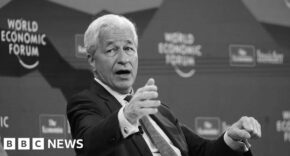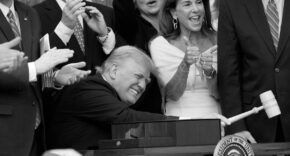On Friday, February 28, 2025, Americans across the country are being called to participate in a 24-hour “economic blackout”—a day of no spending to protest corporate greed, government corruption, and the rollback of diversity, equity, and inclusion (DEI) initiatives. Organized by grassroots group The People’s Union USA, this movement has gained significant traction on social media, with activists urging people to withhold their dollars from major corporations like Amazon, Walmart, Target, and Best Buy, as well as credit card companies and fast-food chains.
The goal of the economic blackout is simple but powerful: to send a clear message to corporations and policymakers that everyday Americans have the power to disrupt the system. “For decades, corporations, politicians, and industries have worked together to rig the system against the American people,” the group states. “They have built an economy designed to exploit workers, suppress wages, and keep the majority of us in a constant state of struggle.”
What Is the Economic Blackout?
The economic blackout is a 24-hour boycott of non-essential spending. Participants are encouraged to avoid shopping online or in-store at major retailers, refraining from purchasing gas, fast food, or other discretionary items. However, the movement makes exceptions for essentials like food, medicine, and bills. In these cases, organizers suggest supporting local businesses and paying with cash to avoid contributing to credit card companies’ profits.
The blackout is not just a one-day event. It’s part of a larger wave of economic resistance. The People’s Union USA has already announced plans for a week-long boycott of Amazon in March, as well as another nationwide blackout on March 28. These actions are designed to hold corporations accountable for their role in perpetuating inequality and to demand systemic change.
Why Target? The 40-Day Boycott
The economic blackout coincides with other boycott efforts, including a 40-day boycott of Target dubbed the “Target Fast.” This protest, led by faith leaders like Rev. Jamal Bryant of New Birth Missionary Baptist Church in Georgia, is a response to Target’s decision to scale back its DEI initiatives. Critics argue that the company’s retreat from diversity programs represents a betrayal of its commitments to social justice, particularly in the wake of George Floyd’s murder in 2020.
“Target has shown an absence of conscience,” Bryant told CNN. “These rollbacks represent more than just corporate decisions; they reflect a deeper erosion of the moral and ethical commitments necessary to build a just society.”
The Broader Movement: Fighting Corporate Greed and Inequality
The economic blackout is part of a growing movement to challenge the status quo. Activists argue that the current economic system prioritizes profits over people, allowing billionaires and corporations to amass wealth while ordinary Americans struggle with rising costs and stagnant wages. By withholding spending, participants hope to demonstrate their collective power and demand accountability.
“For our entire lives, they have told us we have no choice… that we have to accept these insane prices, the corporate greed, the billionaire tax breaks, all while we struggle to just get by,” said John Schwarz, founder of The People’s Union USA, in an Instagram video. “This is about solidarity and sending a clear message: we have the power.”
Will It Make a Difference?
While the economic blackout has garnered widespread attention, its impact remains uncertain. Some experts argue that one-day boycotts often have limited effects, as they are frequently countered by “buycotts” from individuals with opposing views. However, others believe that the current economic climate—marked by inflation and widespread dissatisfaction—could amplify the protest’s impact.
Marshal Cohen, chief retail advisor at market research firm Circana, noted that while the blackout might cause a slight dip in sales, its overall effect may be limited. “Consumers are spending more money on food, and that means there’s more pressure on general merchandise or discretionary products,” he said. However, Anna Tuchman, a marketing professor at Northwestern University, believes the blackout could still make a statement. “This is an opportunity for consumers to show that they have a voice on a single day,” she said.
Celebrity Support and Global Reach
The movement has gained support from celebrities like actor John Leguizamo and actress Bette Midler, who have used their platforms to promote the boycott. “Freeze your spending on Feb. 28th…. Don’t shop! And if you have to, please turn to a local small business!” Midler wrote on social media.
The message has also spread beyond the U.S., with businesses in Canada pledging to join the blackout. “We make our voices heard and show that we are in control of our own choices,” one Canadian business wrote on social media.
A Call to Action
The economic blackout is more than just a boycott—it’s a call to action. It’s a reminder that everyday people have the power to challenge the systems that perpetuate inequality and exploitation. Whether or not the blackout leads to immediate change, it has already sparked a national conversation about corporate accountability, economic justice, and the power of collective action.
As Schwarz put it, “This is just the beginning. We will continue to fight until corporations are held accountable, billionaires pay their fair share, and the working class finally gets the freedom we deserve.”
So, will you join the movement? On February 28, keep your wallet closed and your voice loud. Together, we can send a powerful message: the people have the power.











